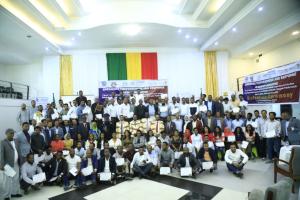The successful completion of the second cohort AVoHC SURGE training in Ethiopia
The World Health Organization Ethiopia is proud to announce the completion of the second cohort of African Health Volunteers Corps (AVoHC) SURGE training in Ethiopia, with 92 participants, 22 of whom are female. The November 6th to December 8th 2023, 2nd cohort training, enhanced the country's emergency preparedness and response capabilities. This is part of the effort under the Emergency Preparedness and Response Initiative, to ensure that each African country is equipped with knowledge and skills to respond to public health emergencies within 24 to 48 hours.
While addressing the trainees, Dr. Mesay Hailu, Director General of the Ethiopian Public Health Institute (EPHI), said, "The AVoHC SURGE initiative aims to develop in-country teams that can be rapidly deployed with technical expertise during times of emergency. The program is building a network of response professionals who can act swiftly and effectively to protect the health and well-being of communities by fostering multi-sectoral coordination and integrating emergency rosters. "
The second cohort of trainees demonstrated a commitment to strengthening the capacity to tackle public health crises. They acquired essential skills and knowledge in core emergency response functions, including epidemiology, surveillance, case management, logistics coordination, and other critical aspects of emergency responses.
The training program was designed to transform knowledge into action. The trainees have the opportunity to become change agents and make a tangible difference in the lives of their communities. The successful completion of the 2nd cohort AVoHC SURGE training signifies Ethiopia's commitment to enhancing its emergency preparedness and response capabilities. The first cohort of trainees have already been deployed within the country for public health emergency responses and found to be effective. Some of the first cohort trainees also served as in-country facilitators during the 2nd cohort training. The second cohort is expected to build upon that foundation and take it to new heights.
Deputy Director General of EPHI Dr. Melkamu Abte also said, "The AVoHC SURGE training program is part of a larger initiative to improve the capacity of all member states to prepare, detect and respond to public health emergencies. The program aims to contribute to training of 3000+ experts in the Africa Region. Fourteen countries have started implementing the training, Ethiopia is leading by training and certifying 190 experts in 2 cohorts and the 2nd cohort was 100% funded through funding from within Ethiopia"
The head of Federal Police Commission Health main Department, Commander Dr. Abrham Tefera, said, "Such training strengthens emergency response capabilities, protecting the health of our communities. As change agents, you can make a difference in the lives of our community."
The second cohort trainees were drawn from Amhara, Tigray, Somalia and Afar Regions, Diredawa, Addis Ababa and from various sectors; the Ministry of Health, Ministry of Agriculture, Ethiopian Public Health Institute, Ethiopian Pharmaceuticals Supply Agency, Federal Hospitals, Federal Police, and Ethiopian Disaster Risk Management Commission.
Dr Patrick Abok, Emergency Preparedness and Response Lead, on behalf of Dr. Nonhlanhla Dlamini, WHO's Representative a.i, congratulates the second cohort of AVoHC SURGE trainees for their dedication and hard work.
The 2nd Cohort is an improved version, following a thorough post 1st Cohort Training review, what worked, what did not work well and strategies for improvement, were identified and applied in the preparation and packaging of this 2nd cohort. And the post training review exercise will always precede a next cohort to ensure continuous improvement.
The success in completion of the training program signifies a commitment to safeguarding public health in Ethiopia. Preparation for Ethiopia 3rd Cohort of AVOHC SURGE training is already commenced as funding is already secured to implement the 3rd and subsequent cohorts. A very big thank you to our partners and donors including the Pandemic Fund.
